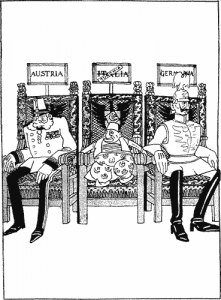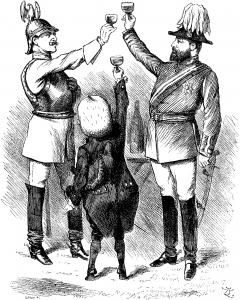I’m sure everyone has heard about how WWI began in 1914. How the assassination of Archduke Franz Ferdinand, of Austria-Hungary, was the trigger that shot Europe’s nations into chaos and war. But there are many, many other theories out there, about the underlying causes that lead to the beginning of this horrific Great War. My theory is that Germany was constantly causing a great disruption to the nations of Europe, which started with the Franco-Prussian war. This war created instability, which was the main cause of the formation of the two main alliances, the Triple Entente and the Triple Alliance, and ultimately lead to the beginning of WWI.
The Franco-Prussian War was between the Second French Empire Of Napoleon III and the German States of the North German Confederation led by the Kingdom of Prussia, and lasted from 1870 to 1871. The main causes of the conflict were the determination of the Prussian statesman, Otto von Bismarck, to unify the North and South of Germany under the control of Prussia, as well as being able to eliminate the influence of France over Germany. Over in France, Napoleon III, emperor of France from 1852 to 1870, was threatened by Prussia’s military strength, as demonstrated in the Austro Prussian War in 1866, and the French feared the shift in the European balance of power that would result if the Prussians succeeded their goal of the unification of Germany.
France was certain that they would be able to defeat Prussia and Germany in a war, and on July 19, 1870, Napoleon III was declared the beginning of the Franco-Prussian war, mainly because of the confidence he was receiving from his military advisers. France soon realized that Germany had the greater manpower, and as Otto von Bismarck had hoped, the southern states of Germany had decided that France was a threat and sided with Prussia.
When the war began, it was made clear that the France was the weaker side of the fight, and Napoleon III soon was forced to surrender to the enemy, on August 2nd 1870. French resistance was carried on against desperate odds by a new government of national defence, which began in Paris on September 4, 1870. Then, on September 19th, Germans attempted to surround and invade Paris. Foreign Minister in the new French Government, Jules Favre, attempted to negotiate with Bismarck, but the discussions were halted when he found that Germany was demanding the French regions of Alsace and Lorraine. Léon Gambetta, the leading figure in the provisional government, organized new French armies which fought German troops, but did not win against them. Paris was taken over by the German side, and Germany then annexed Alsace and Lorraine. France ended up having to pay 5 billion francs as compensation and cover the costs of the German occupation of France’s northern provinces until this compensation was paid.
So really, this war meant that France wanted revenge against Germany, and a determination to recover Alsace and Lorraine kept the two nations constantly prepared for war. Their strong hostility towards each other, was the start of instability caused across European nations.
In 1882, Otto von Bismarck realized that in order to continue to industrialize Germany and make it stronger, he had to supported a security policy to keep peace throughout Europe, and prevent France and Russia from forming an alliance. He soon formed the Triple Alliance, where Germany was allied with Austria-Hungary and Italy. In case a war were to break out, these countries promised to support each other. But in 1888, the choice to concentrate more on a global cause, instead of a cautious security policy set in, when the German Emperor Wilhelmina II came into power. With this change, the Triple Alliance was reformed and renewed, and Russia was quick to align with France.
In 1904, Germany attempted to gain favour in Morocco, but this move sent England, who feared the growth of the German’s fleet, to the arms of Russia and France, which marked the beginning of the Triple Entente.
For the next ten years, the two alliances needed little to provoke a war between them. There was an enormous amount of tension throughout the divided continent, and when the assassination of Archduke Franz Ferdinand took place, it was the perfect spark to infinite the immense hatred between the Triple Alliance and the Triple Entente, and to begin World War I.
Ok so that was A LOT of information to process! I knew that I had to give you the reasons and evidence to support my thesis, but I honestly didn’t anticipate this much writing was going to be involved. So to give you a clearer, and less wordy picture of how I think WWI was ignited, I have decided to create a visual representation of my thoughts, sort of like a brainstorm in picture form. I used the App Paper, my favourite drawing App, and I split the Franco-Prussian War apart from the other events that support my thoughts, because it had way too much information for just a small box. I chose to label it and separate the drawings with boxes, so that my ideas weren’t too messy on the page, I hope you can learn a bit more, in a bit of a less brain clogging way, about the beginning of WWI!
Sources:






